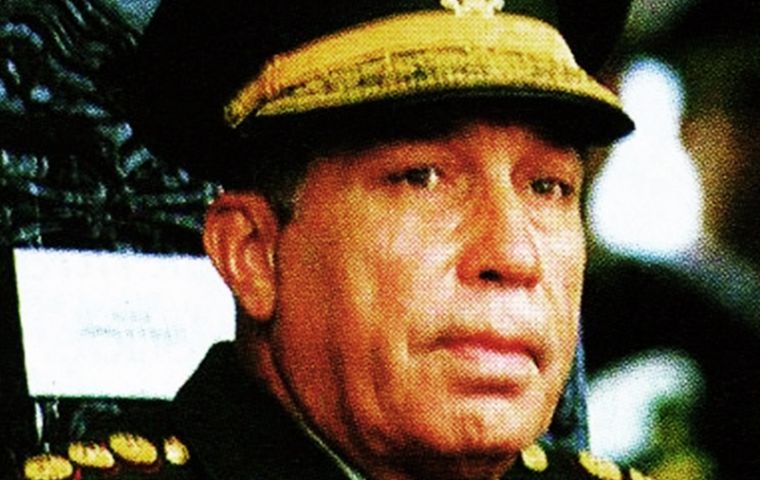MercoPress. South Atlantic News Agency
Former Peruvian ruler Morales dies aged 100
 In June of 2021, Morales was among those who encouraged the Armed Forces to prevent leftist President-elect Pedro Castillo-Terrones from taking office after a tight runoff
In June of 2021, Morales was among those who encouraged the Armed Forces to prevent leftist President-elect Pedro Castillo-Terrones from taking office after a tight runoff Former Peruvian de-facto President Francisco Morales died Thursday at the age of 100, his family told reporters in Lima. The retired general had been sentenced to life imprisonment by an Italian Court for human rights violations.
Francisco Remigio Morales Bermúdez Cerrutti had been born in Lima on Oct. 4, 1921. He was a grandson of General Remigio Morales Bermúdez, a former Constitutional President of Peru between 1890 and 1894.
As Army Chief, Francisco Morales led in August 1975 the so-called 'Tacnazo,' a coup d'état against Juan Velasco Alvarado, who had seven years earlier overthrown Constitutional President Fernando Belaúnde Terry.
During Morales' tenure, known also as the second phase of Peru's Military Revolutionary Government, Morales Bermúdez authorized the return of exiles and pardoned leaders of the Popular Action party, until then persecuted.
Earlier this year, a court in Rome upheld Morales' life sentence for his role in the violations of human rights and forced disappearances of people between 1970 and 1980 in the so-called Operation Condor, a scheme devised by the United States to fight surging leftwing movements across Latin America.
Morales Bermúdez was eligible for trial in Italy because some of his victims of the Montonero guerrillas held dual citizenship, such as Lorenzo Viñas Gigli and Horacio Campiglia.
The cause of death was not disclosed officially, but his son Remigio Morales Bermúdez mentioned they were “related to his age”.
The Condor Plan encompassed Chile, Argentina, Uruguay, Brazil, Paraguay, and Bolivia during the 1970s and 1980s to handle in a coordinated manner the elimination of leftist opponents and people with Communist tendencies. According to a book published by Unesco's International Center for the Promotion of Human Rights, the Condor Plan began Nov. 28, 1975, in Chile, during a security meeting headed by Manuel 'Mamo' Contreras, head of the Chilean secret police.
Morales' fall from grace began soon after relieving Velasco. He called for general elections to form a Constituent Assembly, in which all political forces except Belaúnde's Acción Popular took part. APRA leader Víctor Raúl Haya de la Torre was voted to chair the Assembly which would draft the 1979 Constitution. In the May 18, 1980, elections, Belaúnde was elected to return to the office from where he had been removed by force.
Morales Bermúdez ran in the 1985 elections but garnered very few votes so he dropped his political career. In June of 2021, he was one of the 63 former military top brass to encourage the Armed Forces to prevent leftist President-elect Pedro Castillo-Terrones from taking office after a tight runoff with the Conservative Keiko Fujimori.




Top Comments
Disclaimer & comment rulesCommenting for this story is now closed.
If you have a Facebook account, become a fan and comment on our Facebook Page!